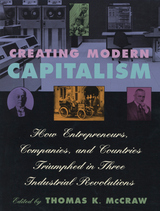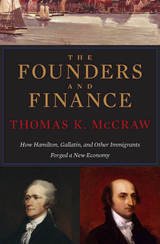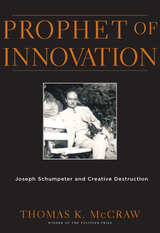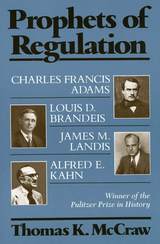

In 1776 the United States government started out on a shoestring and quickly went bankrupt fighting its War of Independence against Britain. At the war’s end, the national government owed tremendous sums to foreign creditors and its own citizens. But lacking the power to tax, it had no means to repay them. The Founders and Finance is the first book to tell the story of how foreign-born financial specialists—immigrants—solved the fiscal crisis and set the United States on a path to long-term economic success.
Pulitzer Prize–winning author Thomas K. McCraw analyzes the skills and worldliness of Alexander Hamilton (from the Danish Virgin Islands), Albert Gallatin (from the Republic of Geneva), and other immigrant founders who guided the nation to prosperity. Their expertise with liquid capital far exceeded that of native-born plantation owners Washington, Jefferson, and Madison, who well understood the management of land and slaves but had only a vague knowledge of financial instruments—currencies, stocks, and bonds. The very rootlessness of America’s immigrant leaders gave them a better understanding of money, credit, and banks, and the way each could be made to serve the public good.
The remarkable financial innovations designed by Hamilton, Gallatin, and other immigrants enabled the United States to control its debts, to pay for the Louisiana Purchase of 1803, and—barely—to fight the War of 1812, which preserved the nation’s hard-won independence from Britain.

Pan Am, Gimbel’s, Pullman, Douglas Aircraft, Digital Equipment Corporation, British Leyland—all once as strong as dinosaurs, all now just as extinct. Destruction of businesses, fortunes, products, and careers is the price of progress toward a better material life. No one understood this bedrock economic principle better than Joseph A. Schumpeter. “Creative destruction,” he said, is the driving force of capitalism.
Described by John Kenneth Galbraith as “the most sophisticated conservative” of the twentieth century, Schumpeter made his mark as the prophet of incessant change. His vision was stark: Nearly all businesses fail, victims of innovation by their competitors. Businesspeople ignore this lesson at their peril—to survive, they must be entrepreneurial and think strategically. Yet in Schumpeter’s view, the general prosperity produced by the “capitalist engine” far outweighs the wreckage it leaves behind.
During a tumultuous life spanning two world wars, the Great Depression, and the early Cold War, Schumpeter reinvented himself many times. From boy wonder in turn-of-the-century Vienna to captivating Harvard professor, he was stalked by tragedy and haunted by the specter of his rival, John Maynard Keynes. By 1983—the centennial of the birth of both men—Forbes christened Schumpeter, not Keynes, the best navigator through the turbulent seas of globalization. Time has proved that assessment accurate.
Prophet of Innovation is also the private story of a man rescued repeatedly by women who loved him and put his well-being above their own. Without them, he would likely have perished, so fierce were the conflicts between his reason and his emotions. Drawing on all of Schumpeter’s writings, including many intimate diaries and letters never before used, this biography paints the full portrait of a magnetic figure who aspired to become the world’s greatest economist, lover, and horseman—and admitted to failure only with the horses.

READERS
Browse our collection.
PUBLISHERS
See BiblioVault's publisher services.
STUDENT SERVICES
Files for college accessibility offices.
UChicago Accessibility Resources
home | accessibility | search | about | contact us
BiblioVault ® 2001 - 2024
The University of Chicago Press









